The Future of Industrial Man
by Peter Drucker

Amazon link: The Future of Industrial Man

#Note the number of books about Drucker ↓
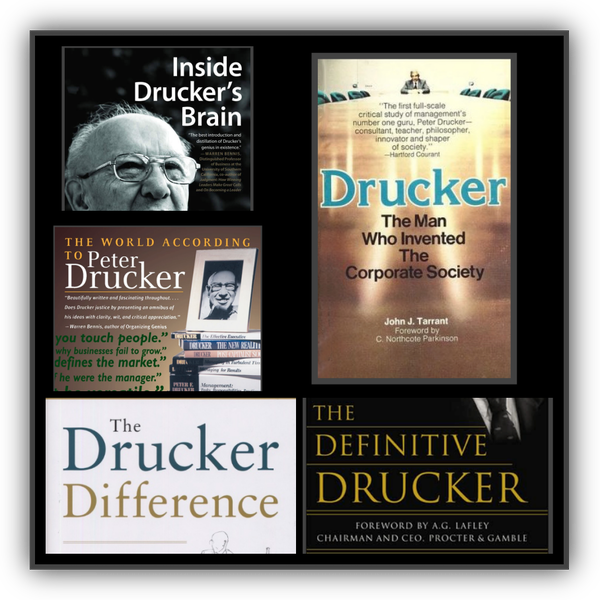
My life as a knowledge worker
Drucker: a political or social ecologist ↑ ↓
“I am not a ‘theoretician’;
through my consulting practice
I am in daily touch with
the concrete opportunities and problems
of a fairly large number of institutions,
foremost among them businesses
but also hospitals, government agencies
and public-service institutions
such as museums and universities.
And I am working with such institutions
on several continents:
North America, including Canada and Mexico;
Latin America; Europe;
Japan and South East Asia.
Still, a consultant is at one remove
from the day-today practice —
that is both his strength
and his weakness.
And so my viewpoint
tends more to be that of an outsider.”
broad worldview ↑
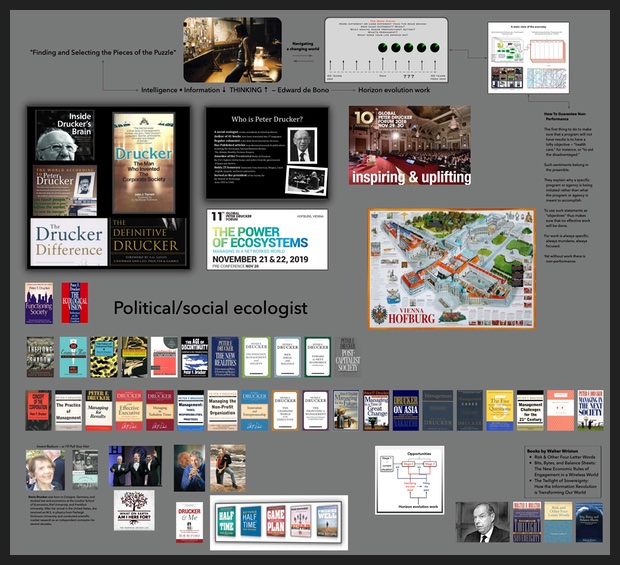
#pdw larger ↑ ::: Books by Peter Drucker ::: Rick Warren + Drucker
Books by Bob Buford and Walter Wriston
Global Peter Drucker Forum ::: Charles Handy — Starting small fires
Post-capitalist executive ↑

Learning to Learn (ecological awareness ::: operacy)
The MEMO they don’t want you to see

Contents
 Introduction to the Transaction Edition Introduction to the Transaction Edition
 The War for the Industrial Society The War for the Industrial Society
 What Is a Functioning Society? What Is a Functioning Society?
 The Mercantile Society of the Nineteenth Century The Mercantile Society of the Nineteenth Century
 The Industrial Reality of the Twentieth Century The Industrial Reality of the Twentieth Century
 The Challenge and the Failure of Hitlerism The Challenge and the Failure of Hitlerism
 Free Society and Free Government Free Society and Free Government
 From Rousseau to Hitler From Rousseau to Hitler
 The Conservative Counter Revolution of 1776 The Conservative Counter Revolution of 1776
 A Conservative Approach A Conservative Approach
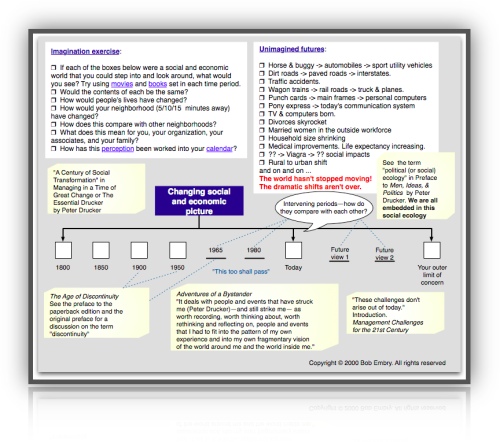
The Changing Social and Economic Picture
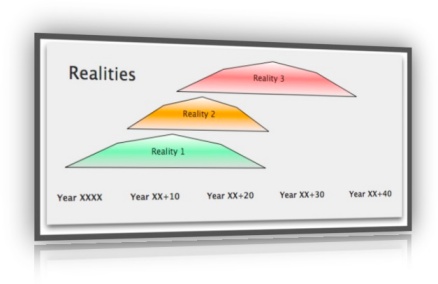
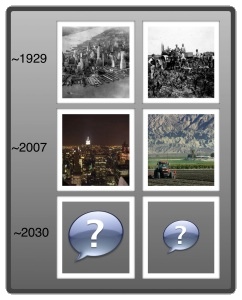
Introduction to the Transaction Edition
The Future of Industrial Man is considered by many friends and critics to be my best book.
It certainly is my most ambitious one.
It is the only book of mine that set out overtly to develop basic social theory.
In fact, it attempts to develop not one but two social theories.
One, it might be called a general theory of society, presents the requirements for any society to be functioning and legitimate.
The other, it might be called the special theory of industrial society, then applies these general concepts to the special case of the industrial society as it emerged in the twentieth century and became dominant with World War II.
I subtitled the book A Conservative Approach; for status and function, its key concepts, are basically conservative terms—terms that go back to Edmund Burke or James Madison rather than to John Locke, let alone to the French Revolution or Karl Marx.
The third key term of this book—legitimacy, is also a fundamentally conservative term.
Alexander Hamilton would have used it, had it been coined in his day (it dates from around 1820, well after his death), and Benjamin Disraeli did indeed use it.
It is a term that recognizes power as a social reality but demands that power be grounded in a higher sanction, in accountability, responsibility, and shared vision.
But while "conservative" in a very old sense, this book is not "neoconservative" (a term that, of course, did not even exist in 1942 when the book was first published).
In the first place there was no need for me ever to become a neoconservative; for that term identifies a former left-winger, and I have never been one.
What we now call neo-conservative, I called "mercantilist" in this book—and I asserted that it had become outmoded and counterproductive—I'd make the same assertion today.
For neoconservatism denies rather than affirms the reality of industrial and postindustrial society.
It is, in effect, only another term for nineteenth-century Manchester Liberalism that preached that economics was everything.
And that is incompatible with a true conservative position.
That position always will and must put community first.
It does not deny the importance of economy and economics—far from it.
In fact I have always been suspect among conservative fundamentalists and among true believers in Real politik (like Henry Kissinger) for being far too much interested in economy and economics; for preaching that only the free market can produce economic results and control power; for preaching that the first duty of a business is to earn the costs of capital, that is, to show a healthy profit; for asserting that military might without economic base is delusion, and so on.
But to make any one dimension of society—even the spiritual one—into the dimension, is abhorrent to true conservatives.
To the likes of Edmund Burke, Robert Walpole, the perennial eighteenth-century English prime minister; Winston Churchill, Benjamin Disreali; but also to Abraham Lincoln or to George Washington—society is multidimensional.
The great challenge—the "Endless Adventure" as Horace Walpole called the craft of politics—is to balance the dimensions.
To be able to do this a society must, however, be a functioning society.
It must give status and function to the individual.
And its power must be accepted as legitimate.
Gemeinschaft und Gesellschaft (Community and Society, 1888) by Ferdinand Toennies (1855-1936) is one of the great classics of social theory and sociology.
Toennies juxtaposed community, which is focused on being, that is, status, with society, which is focused on doing, that is function.
In The Future of Industrial Man I argue that the basic institution of industrial society has to be both, a community that gives status, and a society that does function, and that it needs its own special institution to do so.
I did not yet call this institution an "organization"; nobody used or even knew that term until well after World War II—(it was perhaps used first in my next [1946] book Concept of the Corporation, which is also being reissued by Transaction).
I did not yet see—again nobody did—that this industrial society would be a society of organizations rather than a society of the industrial organization—that realization did not come until a decade later.
Indeed even now many writers, especially economists, only see government and business and do not see all the other organizations, the university, the hospital, the labor union, the church (and many others) through which a modern society discharges its social functions and organizes its social tasks.
But The Future of Industrial Man saw clearly that industrial society is different structurally from nineteenth-century and early twentieth-century society and has different challenges, different values, different opportunities.
And it did see, at a time when most everybody saw the end of free society and free economy—for few, even in the United States believed either to be able to survive World War II and certainly not in Europe—that these challenges of the industrial society promised a postwar world of economic growth and social achievement.
The Future of Industrial Man is not an "optimistic" book; there was little to be optimistic about when the key chapters were written in the summer of 1940 when the radio every day blared out news of Nazi victories, of the collapse of France, and of the British retreat at Dunkirk.
But it is a book that reaffirmed values, hopes, commitments—and they were splendidly validated by the events of the postwar period and by the leadership of the one "industrial" power to emerge from World War II, the United States.
Today we have moved out of the industrial age.
Indeed we are even beyond "post-industrial society."
We are living in what I am now calling "the post-capitalist" society (a book by that title should have appeared by the time The Future of Industrial Man is reprinted).
It is a "knowledge" society rather than an "industrial" society.
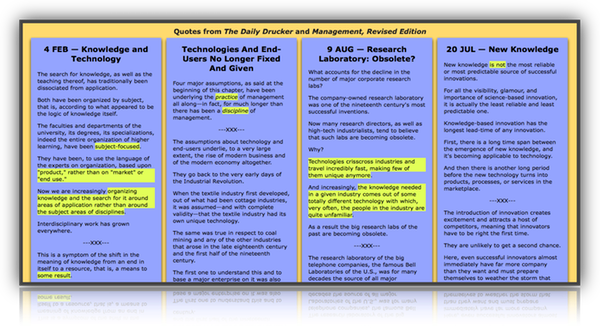
Larger
But the needs, the demands, the quest for status and function are just as great as they were fifty years ago in respect to the industrial society—after all they pertain to a general theory of society and are not special characteristics of the industrial society.
The institution in which to realize these needs is still the organization, though not only the industrial (i.e., manufacturing) organization that dominated developed countries socially from around 1870 or 1880 until 1960 or 1970.
The specific applications we need may differ, to be sure; the principles are the same.
One more comment: this book was written after Europe had gone to war in World War II, but it was finished (though not published) before the United States joined in.
By that time it was quite clear to me that the United States was going to be in the war—though how and when this would come to pass was still quite unknown and unknowable.
The first chapter, "The War for the Industrial Society," may therefore be of particular interest to today's readers.
The things it says were then still quite novel, and indeed quite heretical.
In those days everyone worried—and with good reason—how to survive the war, and how not to be defeated by the forces of darkness.
I worried too, of course; many a night during the months this book was written, I could not go to sleep.
Yet, this book—almost alone in those days—dared ask: What do we hope for the postwar world?
What must we do to deserve one?
"Because I have never been an optimist, I have to keep on trying", a close friend said when he started a "new career" at age seventy-eight.
It might have been the motto of this book.
Peter F. Drucker
Claremont, California
What do you want to be remembered for?
Peter Drucker: Conceptual Resources
The Über Mentor
A political / social ecologist
a different way of seeing and thinking about
the big picture
— lead to his top-of-the-food-chain reputation
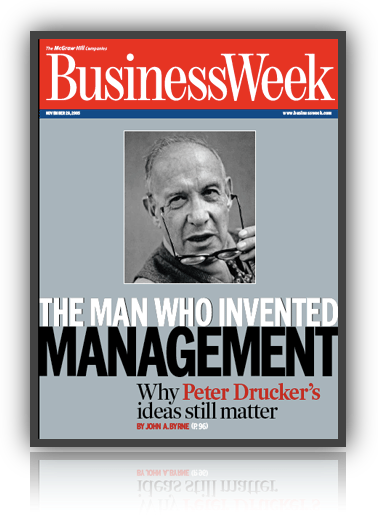
about Management (a shock to the system)
“I am not a ‘theoretician’; through my consulting practice I am in daily touch with the concrete opportunities and problems of a fairly large number of institutions, foremost among them businesses but also hospitals, government agencies and public-service institutions such as museums and universities.
And I am working with such institutions on several continents: North America, including Canada and Mexico; Latin America; Europe; Japan and South East Asia.” — PFD

List of his books
Large combined outline of Drucker’s books — useful for topic searching.

“High tech is living in the nineteenth century,
the pre-management world.
They believe that people pay for technology.
They have a romance with technology.
But people don't pay for technology:
they pay for what they get out of technology.” —
The Frontiers of Management
|
![]()
